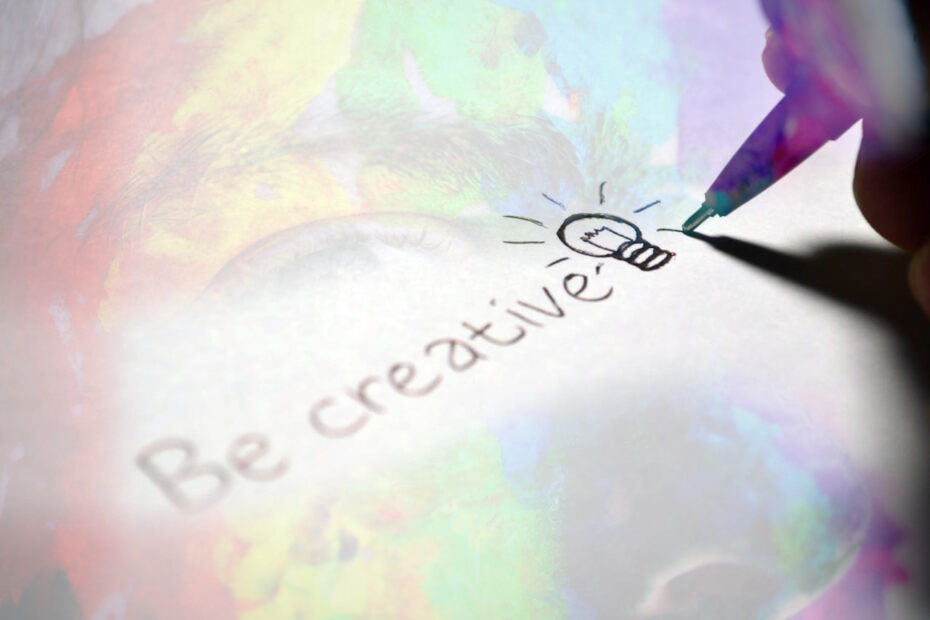Reignite Creativity in Your Golden Years
Have you ever dreamt of finally having the time to rediscover a hidden talent or explore a creative passion you tucked away years ago? Perhaps you yearn to inject more meaning and fulfilment into your life but worry that the spark of creativity might have dimmed with age.
Creativity isn’t just about wielding a paintbrush or crafting a sonnet. It’s the very essence of innovation, problem-solving, and finding new ways to express yourself. It’s the driving force behind a fulfilling life, regardless of your age. Contrary to popular belief, creativity doesn’t fade as we get older – it simply waits to be rekindled.
This misconception might be a lingering pain point for many South Africans approaching retirement. We spend years diligently building careers and nurturing families, often leaving our creative aspirations on the back burner. But retirement presents a golden opportunity to dust off those dreams and reignite your creative spirit.
Building upon our previous discussions in “Finding Purpose in Retirement by Transforming Challenges into Opportunities for Growth” and “Decorating Tips: Transform Your Space into a Personal Oasis“, this post will equip you with the tools and inspiration to unleash your inner genius.
We’ll explore the myth of diminishing creativity, delve into the benefits of creative pursuits in your golden years, and provide practical guidance on how to identify your hidden talents and spark your creative fire. Get ready to brainstorm new ideas, experiment with different mediums, and discover the immense joy that comes with expressing yourself creatively.

What is Creativity?
Creativity is much more than just wielding a paintbrush or putting pen to paper. It’s a powerful human capability that encompasses a vast spectrum of skills and processes. At its core, creativity is about generating new and valuable ideas. This can manifest in countless ways, from:
- Problem-Solving: Approaching challenges with fresh perspectives and devising innovative solutions.
- Innovation: Developing original ideas and concepts that improve upon existing methods or systems.
- Finding New Ways to Express Yourself: Whether it’s through writing, cooking, gardening, or even knitting, creativity allows you to share your unique perspective and experiences with the world.
But creativity isn’t just a metaphorical wellspring of ideas; it has a fascinating neurological basis. Studies have shown that creative thinking activates various regions of the brain, including those responsible for:
- Imagination: The ability to form mental images and concepts that don’t necessarily correspond to reality.
- Divergent Thinking: The process of generating a multitude of unique ideas and solutions.
- Convergent Thinking: The ability to analyze and evaluate different ideas to arrive at the best solution.
Intriguingly, research suggests a strong link between creativity and well-being. Engaging in creative activities can:
- Boost cognitive function: Learning new skills and challenging yourself creatively can help keep your mind sharp and improve memory.
- Reduce stress and anxiety: Focusing on the creative process can be a form of mindfulness, promoting relaxation and emotional well-being.
- Increase feelings of purpose and fulfilment: Expressing yourself creatively can provide a sense of accomplishment and satisfaction.
- Enhance social connection: Many creative pursuits are inherently social, allowing you to connect with like-minded individuals and build a sense of community.
In essence, creativity is a powerful tool that can enrich your life in countless ways. The good news? You don’t need to be a renowned artist or inventor to reap the benefits.
How can our educational systems sometimes stifle creativity, and what strategies can you use to overcome these limitations to reignite your creative spark?

How We Are Educated Out of Creativity
Many of us might look back on our school days and struggle to recall moments where creativity was truly celebrated. Traditional education systems often prioritize standardized tests and rote learning, leaving little room for imaginative exploration. This emphasis on conformity can inadvertently stifle the natural curiosity and creative spark that children possess.
One of the biggest culprits in this stifling of creativity is the ingrained fear of failure. From a young age, we’re conditioned to view mistakes as something to be avoided at all costs. This fear can lead to a reluctance to take risks, experiment with new ideas, or venture outside the comfort zone – all essential ingredients for creative expression. The pressure to achieve perfect grades on standardized tests can further exacerbate this fear, leading students to prioritize regurgitating memorized facts over independent thought and exploration.
The effects of this “fear of failure” mentality often extend far beyond the classroom. As we navigate the social pressures of adulthood, the need to fit in and conform can limit our willingness to express ourselves creatively. Whether it’s the fear of judgment from colleagues or the hesitation to pursue an unconventional career path, these societal pressures can act as a powerful deterrent to creative exploration.
Here’s a relatable example: Imagine someone who harboured a passion for writing fantastical stories throughout their youth. However, societal expectations or a fear of rejection might have led them to pursue a more “practical” career path. Now, in their golden years, they might yearn to revisit that passion for writing but feel apprehensive about sharing their work with the world.
This is precisely why retirement presents such a unique opportunity. Free from the pressures of work and societal expectations, you can finally shed those inhibitions and embrace your creative spirit.
How can overcoming the fear of failure help you reignite your creative fire?

Making Mistakes / Taking Chances: Embracing the Power of Failure
The fear of failure can be a formidable roadblock on the path to creative expression. As we saw in the previous section, the pressure to conform and the anxiety of making mistakes instilled during our formative years can lead to a reluctance to take risks and experiment with new ideas. This, in turn, stifles the very essence of creativity – the ability to explore the unknown and generate novel solutions.
The irony is that failure is an inevitable and often essential part of the creative process. Every successful invention, groundbreaking work of art, or award-winning novel came about after countless failed attempts and revisions. Think of Thomas Edison, who famously remarked after failing to invent the lightbulb thousands of times, “I haven’t failed. I’ve just found 10,000 ways that won’t work.” His relentless pursuit of innovation, despite repeated setbacks, ultimately led to a revolutionary invention that changed the world.
The key lies in reframing our perception of mistakes. Instead of viewing them as demoralizing failures, we can see them as valuable learning opportunities. Each misstep provides a chance to analyze what went wrong, refine our approach, and ultimately come closer to achieving our creative goals. This growth mindset – the belief that our abilities and talents can be developed through effort and perseverance – is crucial for fostering creativity throughout life.
Here are some practical tips to help you overcome the fear of failure and embrace the power of experimentation:
- Shift your focus: Instead of obsessing over the end product, focus on enjoying the creative process itself. Experiment with different techniques, embrace the joy of learning new skills and celebrate the small victories along the way.
- Reframe mistakes as “learning experiences”: When you encounter a setback, take a step back, analyze what went wrong, and use it as an opportunity to improve your approach.
- Embrace imperfection: Perfectionism can be a creativity killer. Learn to accept that your work may not be flawless right away, and allow yourself the freedom to create without the pressure of achieving immediate perfection.
- Seek inspiration from successful failures: Research the stories of renowned creatives who overcame numerous rejections and setbacks on their path to success. J.K. Rowling’s Harry Potter manuscript was initially rejected by 12 publishers before becoming a global phenomenon. Knowing that even the most celebrated figures have encountered failures can be a powerful motivator.
- Start small and celebrate progress: Don’t overwhelm yourself by trying to tackle a monumental project right away. Begin with smaller, manageable creative endeavours and celebrate your progress, no matter how incremental.
Remember, retirement is the perfect time to shed inhibitions and embrace the freedom to experiment.
What are the benefits of reigniting your creativity in your golden years, and what practical steps can help you discover your hidden talents?

Retirement: The Perfect Time to Unleash Your Creative Spirit
Imagine a life free from the constraints of a daily commute, looming deadlines, and the pressure to perform. Retirement offers a unique opportunity to finally prioritize your passions and rediscover the joy of creative exploration. For many, the years spent diligently building careers and nurturing families leave little room for indulging in creative pursuits. Retirement, however, presents a golden opportunity to dust off those long-held dreams and reignite your creative spark.
One of the most significant advantages of retirement is the abundance of time. No longer bound by the rigid schedules of working life, you have the freedom to delve into creative projects at your own pace. Whether it’s dedicating mornings to writing poetry, enrolling in afternoon pottery classes, or finally tackling that novel you’ve always envisioned, retirement empowers you to structure your days around your creative passions.
But the benefits of reigniting your creativity extend far beyond mere enjoyment. Engaging in creative activities can have a profound impact on your well-being in your golden years. Here are some key advantages:
- Mental Stimulation: Learning new skills and challenging yourself creatively can help keep your mind sharp, improve memory, and boost cognitive function. Studies have shown that engaging in creative pursuits can even help delay the onset of age-related cognitive decline.
- Stress Reduction: Focusing on the present moment and immersing yourself in the creative process can be a form of mindfulness. This can lead to a reduction in stress and anxiety, promoting feelings of relaxation and overall well-being.
- Increased Social Connection: Many creative pursuits are inherently social, allowing you to connect with like-minded individuals who share your passions. Joining a writing group, taking a painting class, or participating in a local craft fair can all provide opportunities to build new friendships and foster a sense of community.
- Enhanced Sense of Purpose and Fulfillment: Expressing yourself creatively can provide a sense of accomplishment and satisfaction. Seeing your ideas come to life, whether it’s a completed painting, a beautifully crafted piece of jewellery, or a published short story, can be incredibly rewarding.
Here’s an inspiring example: After decades of working as a lawyer, Margaret, a retiree in Durbanville, always dreamt of pursuing her passion for pottery. Upon retirement, she enrolled in a local ceramics class and discovered a hidden talent. Margaret’s unique and whimsical pottery creations quickly gained popularity at local craft fairs, and she even opened a small home studio where she now conducts pottery workshops for other retirees. Margaret’s story exemplifies the transformative power of creativity in retirement. It’s never too late to explore your passions and discover talents you never knew you possessed.
What practical tools and strategies can help you identify your creative inclinations and spark your creative fire in your golden years?
Bible Study Blog
- Bible Message – Week 23. God brings life to dead situations. Pst. Johan Venter
- Bible Message – Week 24. The SHEPHERD of Psalm 23. Pst. Johan Venter
- Bible Message – Week 25. The DAY the MANNA ceased. Pst. Johan Venter
- Bible Message – Week 26. Oil: It is not OVER, because God is not FINISHED. Pst. Johan Venter
How to Start Fostering Your Creativity – Finding Your Talents
Retirement marks a new chapter, an exciting time to reconnect with yourself and rediscover the spark of creativity. But where do you begin? Here are some practical strategies to help you identify your hidden talents and reignite your creative spirit:
1. Unleash Your Inner Brainstorming Genius:
Sometimes, the biggest hurdle to creativity is simply getting started. Here are a few brainstorming techniques to jumpstart your creative exploration:
- Mind Mapping: Grab a pen and paper, and jot down a central theme or interest in the middle. From there, branch out with related ideas, keywords, and associations. Don’t be afraid to get messy and let your thoughts flow freely!
- Freewriting: Set a timer for 5-10 minutes and write continuously without stopping, censoring, or editing. Write whatever comes to mind, even if it seems irrelevant at first. This technique can help you unearth hidden passions and unexpected creative connections. “The consequence [of writing] is that you must start by writing the wrong meanings in the wrong words; but keep writing until you get to the right meanings in the right words. Only in the end will you know what you are saying.” —Peter Elbow
- Experiment with Different Mediums: Don’t limit yourself! Try your hand at painting, writing, photography, music, woodworking, gardening – anything that piques your curiosity. You might be surprised to discover a hidden talent you never knew you possessed.
2. Reconnect with Your Passions:
Take a trip down memory lane and reflect on your hobbies and interests from your younger years. Did you enjoy drawing comics as a child? Perhaps you loved tinkering with electronics or writing short stories. Consider how you can rekindle these passions in retirement. You could enrol in online drawing courses, join a local electronics club, or participate in a writing workshop for seniors.
3. Embrace the Journey, Not Just the Destination:
It’s important to remember that creativity is a process, not a product. Don’t get discouraged if your initial attempts aren’t masterpieces. Focus on enjoying the journey of exploration, learning new skills, and expressing yourself creatively. Celebrate your progress, no matter how small, and find joy in the act of creating itself.
4. Resources and Support:
The good news is that you don’t have to embark on this creative adventure alone. There is a wealth of resources available to help retirees explore their creativity:
- Online Courses: Numerous online platforms offer courses in a vast array of creative disciplines, from painting and writing to coding and web design. Many of these courses cater specifically to older adults and offer flexible learning schedules.
- Local Workshops and Classes: Many community centres, libraries, and senior centres offer workshops and classes in various creative pursuits. This is a fantastic way to learn new skills, meet like-minded individuals, and build a sense of community.
- Senior Art Clubs and Groups: Joining a local art club or creative group can provide invaluable support, inspiration, and opportunities to share your work with others.
Remember, retirement is a time to embrace new challenges, explore your passions, and unleash your inner creative genius.
What are the key takeaways to solidify and how can you be inspired to embark on your creative journey?
More About La Gratitude Accommodation
Unleash Your Creative Spirit and Embrace a Fulfilling Retirement
This blog post has explored the transformative power of creativity and its immense benefits for retirees. We’ve debunked the myth of diminishing creativity with age, highlighted the importance of embracing mistakes as stepping stones to growth, and provided practical tools and strategies to help you rediscover your passions and ignite your creative spark.
Remember, retirement is a golden opportunity to finally prioritize your creative aspirations. Whether it’s rediscovering a childhood hobby, learning a new skill, or simply allowing yourself the freedom to express yourself creatively, the possibilities are endless. Engaging in creative pursuits can enhance your well-being, boost cognitive function, and bring a renewed sense of purpose and fulfilment to your golden years.
Thank you for joining us on this exploration of creativity in retirement! We encourage you to follow us on social media for more inspiring content and helpful tips. As the renowned artist Pablo Picasso once said, “Everything you can imagine is real. Start creating.” Let this be your inspiration to embark on your creative adventure and embrace the boundless possibilities that await you in retirement. We wish you all the best on your creative journey!
Thank you for your continued support, we appreciate your likes, follows and retweets on Facebook, Twitter, Pinterest and LinkedIn. Make sure to share this post with friends and family.
You can make a difference
With your assistance, the volunteers at La Gratitude will be able to take better care of not only the residents at the old age home but also the greater Newcastle community. La Gratitude is constantly involved in outreach projects to help the elderly in need in and around Newcastle.
Your donations will be greatly beneficial in the provision of food and other basic necessities for the less fortunate elderly people that require assistance.
Donating is easy, click here to donate now.
















